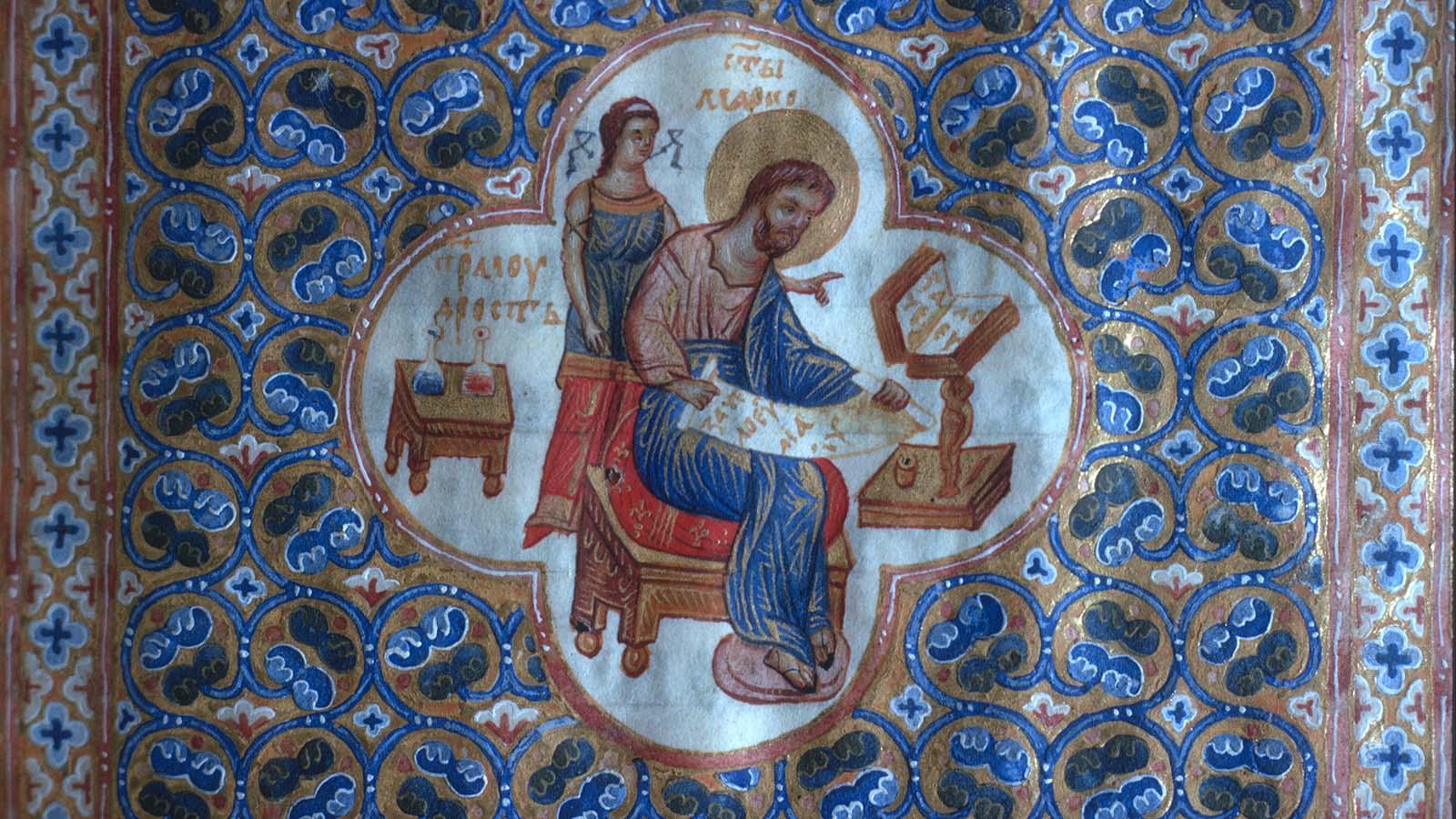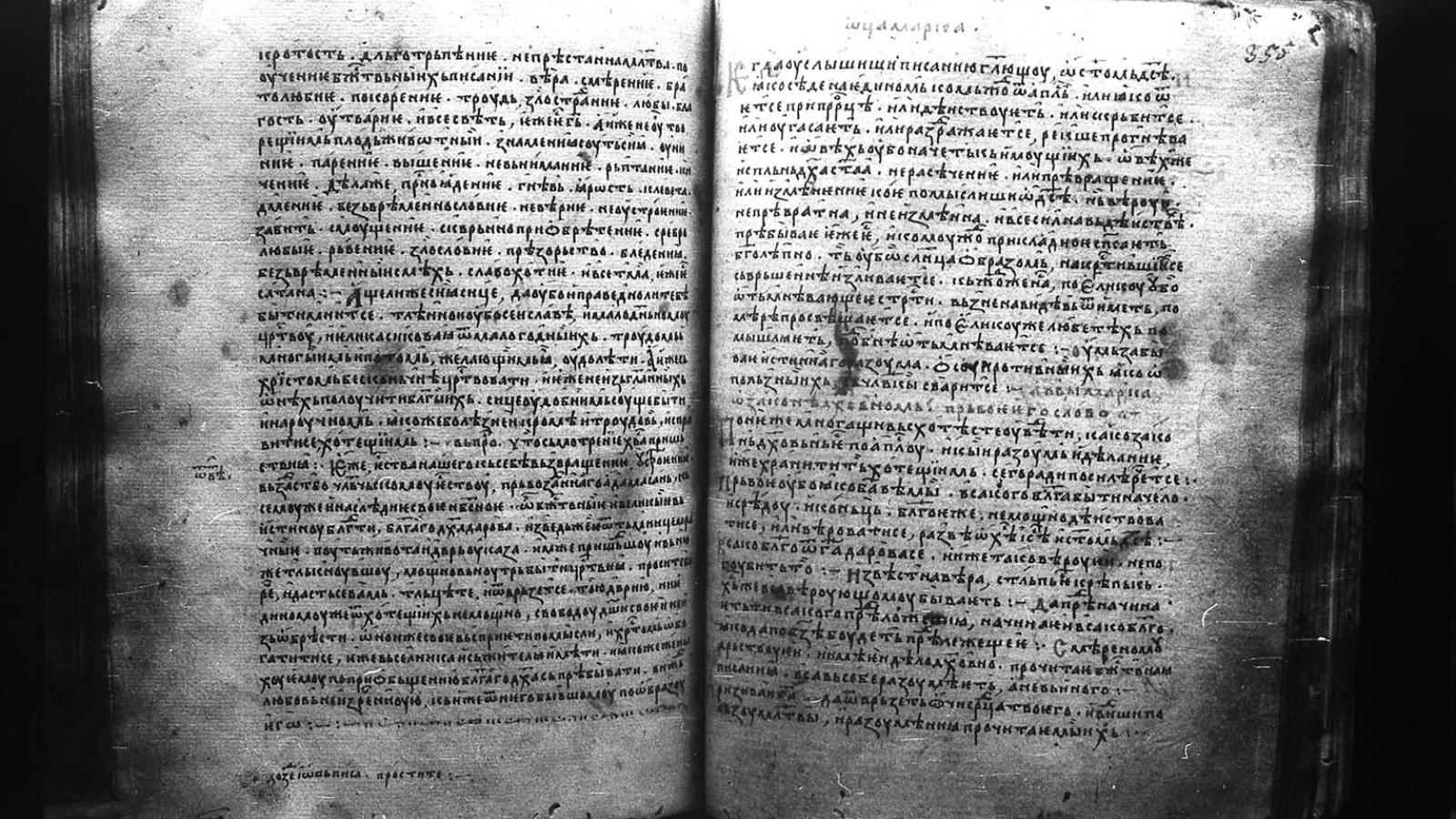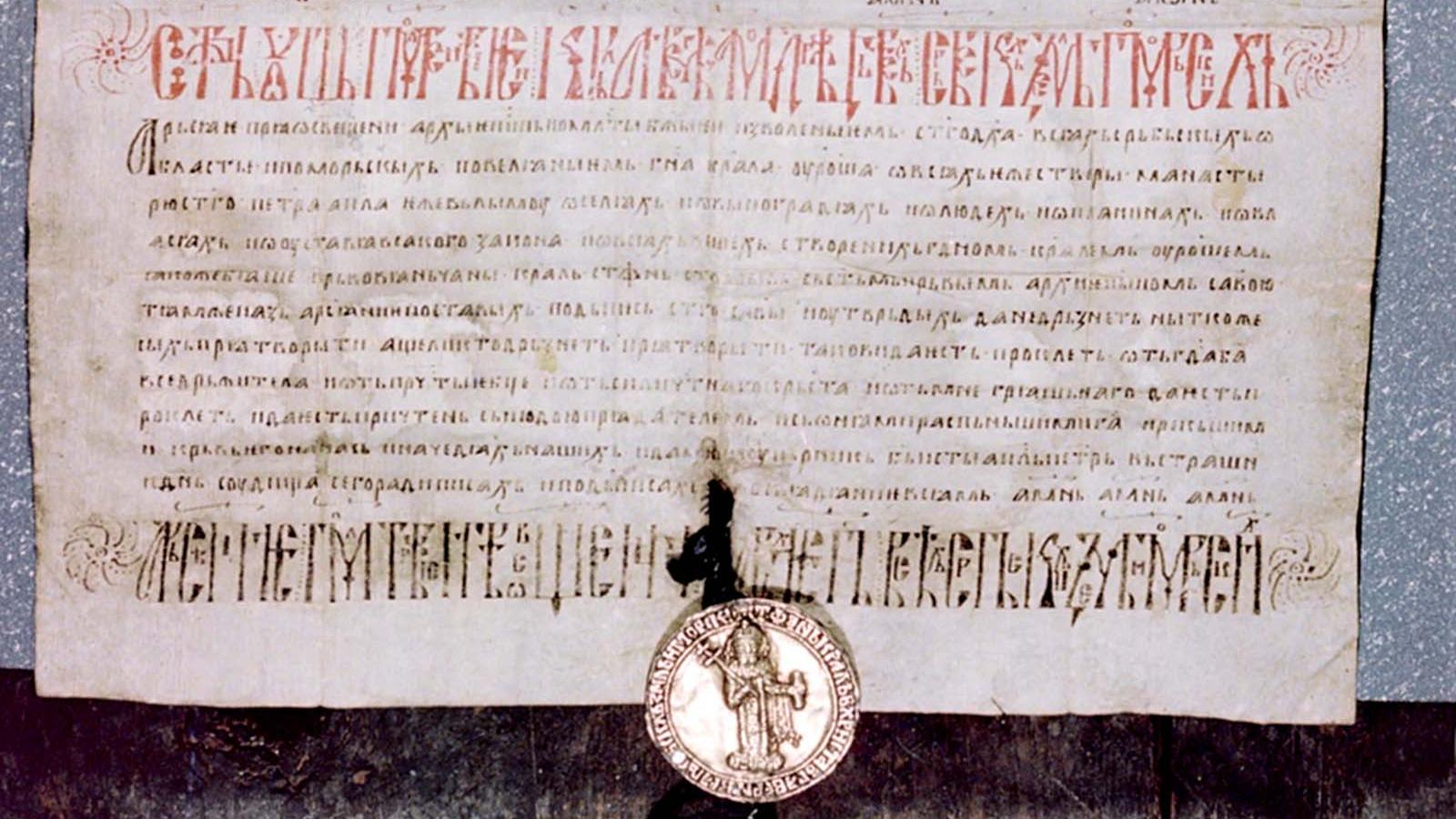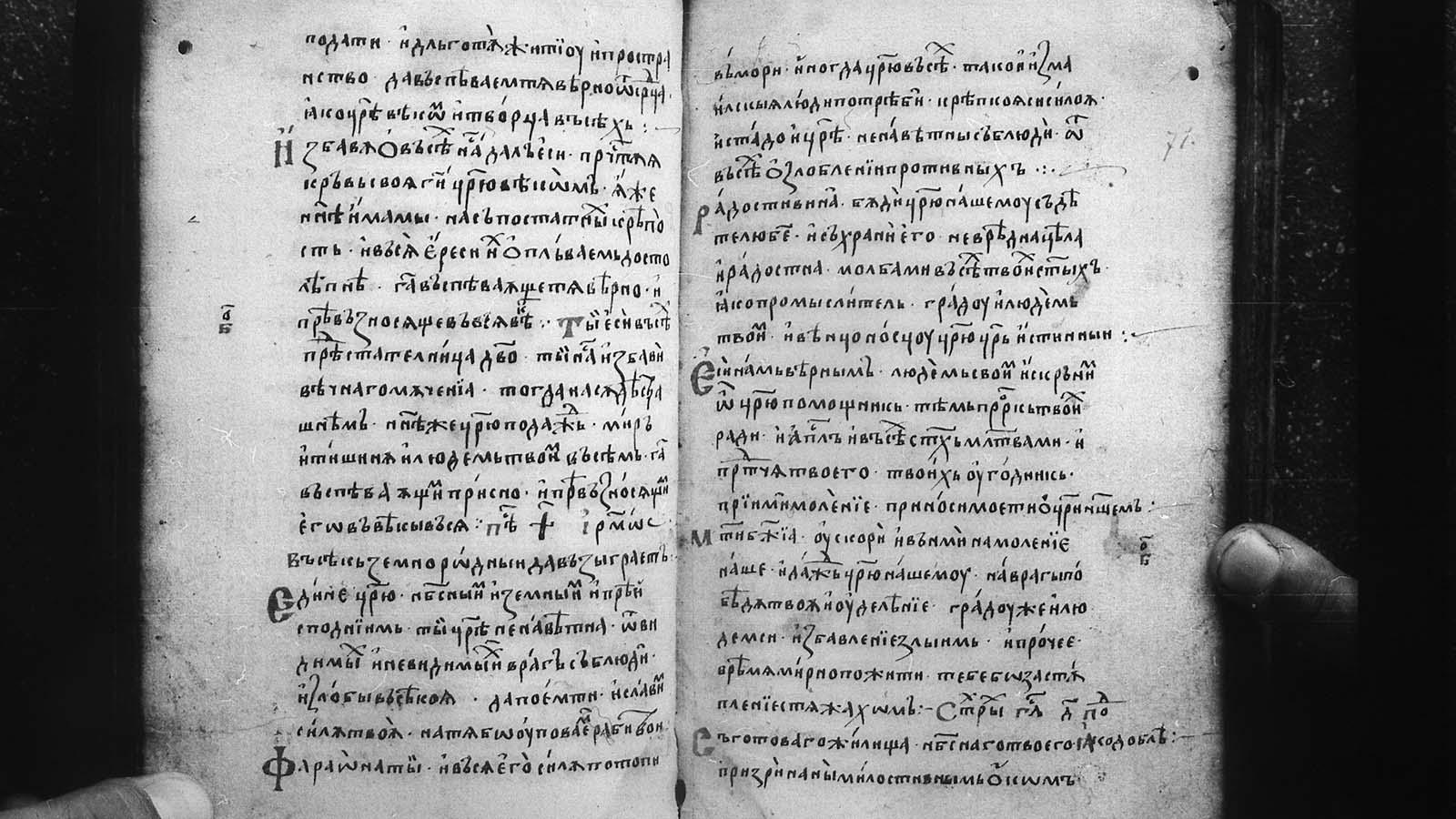About the MSSI
Who We Are
The Hilandar Research Library (HRL), the Resource Center for Medieval Slavic Studies (RCMSS), and the Department of Slavic and East European Languages and Cultures (SEELC) at The Ohio State University host a biennial four-week intensive Medieval Slavic Summer Institute (MSSI) for qualified graduate students in Columbus, Ohio.
Participants work with original Cyrillic manuscripts dating to the 15th-19th centuries from the HRL collection. Manuscript material on microform from the HRL’s extensive holdings forms a large part of the lectures and exercises. The Institute includes two main topics, Manuscript Description and Access and Readings in Church Slavonic, in the course "Medieval Slavic Workshop" (Slavic 8741). There are also guest lecturers for specific topics. All lectures are in English.
Applicants must be graduate students with a BA degree and with a reading knowledge of Cyrillic and of at least one Slavic language. Preference is given to applicants with reading knowledge of Old Church Slavonic or some other pre-modern Slavic language.
The HRL, the largest repository of medieval Slavic Cyrillic texts on microform in the world, includes holdings from over 100 monastic, private, museum, and library collections of twenty-three countries. There are over 6000 Cyrillic manuscripts on microform in the HRL, as well as over 1000 Cyrillic early pre-1800 printed books on microform. The holdings range from the eleventh to twentieth centuries, with a particularly strong collection of manuscripts from the fourteenth to sixteenth centuries. About half of the manuscripts are East Slavic, with much of the remainder South Slavic in provenience.
Pursuant to a recommendation by the RCMSS North American Advisory Council in 1998, the RCMSS in cooperation with the Department of Slavic and East European Languages and Literatures (now SEELC) arranged for the inaugural MSSI to take place in June-July 1999. It began as an opportunity for graduate students to learn how to handle original manuscripts, analyze the content and physical make-up of manuscripts from the Cyrillic manuscript tradition, and understand how to read and interpret the texts.
Organized by Predrag Matejic (HRL Curator and RCMSS Director), Daniel E. Collins (SEELC), M.A. "Pasha" Johnson (HRL Assistant Curator), and Helene Senecal (RCMSS Coordinator, 1997-2013), MSSI 1999, attended by fourteen participants, was three weeks long. Since then, the MSSI has continued more or less biennially as a four-week intensive seminar.
In November 2018, Professor Predrag Matejic retired, and M.A. "Pasha" Johnson became the HRL Curator and RCMSS Director.
Comments from MSSI Instructors
M.A. "Pasha" Johnson
Instructor: MSSI 2017-2024; Staff: MSSI 1999-2006, 2013-2015
Director, Resource Center for Medieval Slavic Studies
Curator, Hilandar Research Library
Associate Professor, University Libraries, The Ohio State University
"What is the most important thing participants learn from the MSSI?"
Collaboration and the value of interdisciplinary approaches to research. Also, having gone through this intensive workshop with colleagues who share similar interests in what is a somewhat esoteric field in the United States, the participants wind up with the basis for their own professional network of "human resources." Each MSSI is different, but often friendships are forged that last beyond the summer. Encountering alumni from other MSSI sessions offers an immediate bond and point of reference for collegial relations and discourse.
The MSSI participants are assigned an original manuscript to describe. The daily lectures provide direction on how to "read" and describe the manuscript, but each participant makes unique contributions from their own training and interests. The answer to why a particular rubric appears in the margin of a manuscript leaf and its decipherment may be the result of artistic, linguistic, historical and/or theological conventions. The participants can learn a lot from the MSSI and from each other, and I always learn a lot from the participants.
Dr. Bojan Belić
Instructor: MSSI 2022-2024; Participant: MSSI 1999
Teaching Professor, Department Languages Coordinator
Slavic Languages and Literatures, University of Washington, Seattle
"Why does one participate in the MSSI?"
There are – and I can vouch for this with my own background, which includes being both an MSSI participant and an MSSI instructor – various reasons for someone to make the decision to participate in the MSSI. Naturally, there are those subjectively individual reasons – everything revolving around one’s own scholarly interests. There are, however, those reasons that, at first, may not seem to be as apparent as the former, yet they turn out to be just as relevant. They are the experiences revolving around the collaborative work – both among the MSSI participants themselves, as well as between the participants and the MSSI instructors – that is part of the essence of the MSSI. Much like the unique Toni Morrison advocated for education being about “intelligent problem-solving and humans relating to one another in mutually constructive ways,” every single MSSI allows those who participate in them to unite their diverse selves around the common field of Medieval Slavic studies and, at that, with the unceasing support from all resources imagined of the one and only Hilandar Research Library and its staff.
Dr. Jennifer Spock
Instructor: MSSI 2006-2024
Professor, History, Eastern Kentucky University
"Why did you agree to be a guest lecturer for the MSSI?"
I have had the opportunity and the privilege of conducting the practicum on Old Russian cursive script from the sixteenth and seventeenth centuries at the MSSI. Each time I have participated in the MSSI in this way, it has been great fun to pass along a skill that was hard won for me and many other scholars--reading the cursive is not an easy skill to acquire and necessitates a lot of practice until, one day, suddenly it becomes surprisingly clear. Anything I can do to help the next generation of medieval Slavic scholars is important! [One year I was] fortunate to be present in the Jack & Jan Creighton Special Collections Reading Room during the last week of the MSSI, and it [was] quite rewarding and exciting to see how well the participants have absorbed all the material from the month-long institute. I have further enjoyed helping them to "decode" the cursive inscriptions and marginalia that they have found in the manuscript books with which they are working.
Dr. Eric J. Johnson
Instructor: MSSI 2011-2024
Professor, University Libraries, The Ohio State University
Why do you think it’s valuable to focus on working first-hand with original manuscripts?
Working closely—and immediately—with original manuscripts is essential for anyone interested in exploring the textual histories and cultures of previous eras. A manuscript’s (or printed book’s or other document’s) textual contents, of course, convey a great deal of information, but other aspects of the manuscript—such as it’s size, page layout, use of decorative or illustrative elements, quality of production, binding construction, style of handwriting, and ancillary texts, such as reader-added annotations and marks of ownership throughout time—are equally important for a full understanding of both text and the physical manuscript that encompasses it. The MSSI offers participants the opportunity to work closely with unique manuscripts to uncover the myriad ways that text, paratext, and the study of the physical book work together to tell us about the past. Through it’s exceptional collections of rare books and manuscripts, as well as secondary sources dedicated to the study of the Slavic book in all its forms, the Hilandar Research Library provides the ideal laboratory in which to experiment with and learn from the many historical documents with which MSSI’s students have the opportunity to work.
Dr. Daniel E. Collins
Instructor: MSSI 1999-2019
Associate Professor, SEELC, The Ohio State University
"What do you enjoy most about being an instructor of the MSSI?"
I enjoy seeing the amazing rise in confidence that students/participants have over the course of 4 weeks, as they gain experience reading and analyzing authentic manuscripts.
Dr. Predrag Matejic
Instructor: MSSI 1999-2017
Professor Emeritus, University Libraries, The Ohio State University
Director, Resource Center for Medieval Slavic Studies (1989-2018)
Curator, Hilandar Research Library (1982-2018)
"What do you want participants to get out of the MSSI?"
We have always known that there were at least a few graduate students at OSU and in North America (and elsewhere) who have a need but no practical way in which to obtain necessary knowledge about original, older Cyrillic materials, including manuscripts. In short, we wish for students to learn how to be comfortable and knowledgeable about working with original Cyrillic manuscripts. We also want them to understand that the languages in the majority of these Cyrillic manuscripts are "living languages” – ones used among many East Slavs not only in the past, but still often used in the Russian Orthodox Church, for example. Dr. Collins uses the actual texts we have in facsimiles and manuscripts on microfilm to help the graduate students better understand not only the differences, but the shared similarities in the different Slavic linguistic communities of the past. That is why the MSSI was also treated like two separate, but mutually-supportive academic courses: “Practical Slavic Paleography” and “Readings in Church Slavonic."
MSSI Guest Lecturers
Dr. Justin Willson
Guest Lecturer: MSSI 2024; Participant: MSSI 2017
Curator, Icon Museum + Study Center (Clinton, Massachusetts)
"Icon Prints: The Pimen Sofronov Archives" and "What an Art Historian Looks for in Manuscripts"
Ashlyn Oprescu
Guest Lecturer: MSSI 2024
Book and Paper Conservator, University Libraries, The Ohio State University
“Conservation of Paper Manuscripts and Bookbinding”
Dr. Maria Alessia Rossi
Guest Lecturer: MSSI 2024 with Dr. Sullivan
Art History Specialist, Department of Art and Archaeology, Princeton University
"Slavic History and Culture in Context: Digital Initiatives” (via zoom)
Dr. Alice Isabella Sullivan
Guest Lecturer: MSSI 2022, MSSI 2024 with Dr. Rossi; Participant: MSSI 2015
Assistant Professor, History of Art and Architecture, Tufts University
"Art in Medieval Manuscripts" (2022 via zoom); "Slavic History and Culture in Context: Digital Initiatives” (2024 via zoom)
Dr. Ievgeniia Sakal
Guest Lecturer: MSSI 2019; Participant: MSSI 2015
Doctoral Student, History, Yale University (Ph.D 2021)
“’This is not Chrysostom!’ Reception and Circulation of the Holy Fathers Among the 17th-century Orthodox Ecclesiast”
Dr. Christian Raffensperger
Guest Lecturer: MSSI 2017
Associate Professor of History, Wittenberg University (Springfield, Ohio)
“Kinship Networks in Medieval Eastern Europe”
Anna Arays
Guest Lecturer: MSSI 2015; Participant: MSSI 2013
Special Collections Cataloging Associate, University Libraries, The Ohio State University
"Describing Muscovite books of the 17th century: the eternal struggle"




